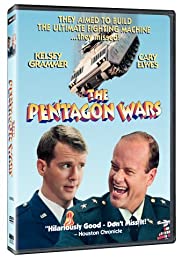
THE PENTAGON WARS
US, 1998, 104 minutes, Colour.
Kelsey Grammer, Cary Elwes, Viola Davis, John C.Mc Ginley, Tom Wright, Clifton Powell, Dewey Weber, Richard Schiff, J. C.Mc Kenzie, Richard Benjamin, Olympia Dukakis.
Directed by Richard Benjamin.
Pentagon Wars was released in 1998, a satirical film about the United States and the military in the latter part of the 20th century. However, it is still relevant in the 21st-century.
The film is based on actual events and the military official, played by Cary Elwes, one of his best roles, who is placed in charge of an investigation about the development of a tank, also used as a carrier, with developments from the 1960s and continual adjustments ordered by the Pentagon. By the 1990s, the vehicle has been modified so often but is backed by the authorities and demonstrations ordered. This ends in fiasco.
The film has very sharp dialogue, satirical and critical about bureaucracy in the Pentagon, decisions made because of ambition rather than knowledge, financial grants allowed, committees putting in their contributions, thinking they will improve the vehicle but only making it more cumbersome and, even, absurd.
While there are demonstrations of the development of the tank over the decades, scenes of meetings and ultimately meaningless contributions and dialogue, the background is also a Senate hearing, especially with the general, played effectively by Kelsey Grammar rationalising his behaviour. Amongst the cast there is also Bradley Whitford as the frustrated official who, in fear of losing his job, carries out the decisions, putting pressure on the designers, but ultimately wanting to get information to the investigator. There is John C Mc Ginley as a smug military man, supervisor of the demonstrations and ridiculing the investigator. And, interesting to see, by Viola Davis in an early role as the investigator’s assistant. Olympia Dukakis as the head of the Senate investigation.
The film was directed by actor-director Richard Benjamin who also has a cameo role.
A film of the 20th century – but, not out of place, in Donald Trump’s America.
1. A film of the 1990s? Looking back to 1968 to 1985? Pre-9/11?
2. The title, work at the Pentagon, development of weapons and equipment, committees, scientists in design, officials and budgets, careers and reputations? $17 billion spent in 17 years? Sequences? The range of tanks, testing, crashes and failures?
3. A film for television audiences? Entertainment? Satire? Critique?
4. The framework of General Partridge, many close-ups, his expressions, face, words, insinuations, denials? The offscreen interrogation? The recurring of the hearings? The president of the hearings, her questions, her reactions?
5. Colonel Burton, air force background, his commission to investigate the Bradley tanks? His not being welcomed by General Partridge, Partridge’s associates on the ground? The workingmen? Suspicions of an official visiting and questioning? His office, Sgt Fanning, persistence, her work, advice, support?
6. Bureaucracy, red tape, estimated times for investigations and tests, report writing?
7. Burton, going to see the tank, the reaction of the officials, laughing behind his back, the men questioning? His wanting to see the documentation? Their sending him absolutely everything, filling his office? His perseverance with the reading? The discovery of the truth?
8. The flashbacks, to 1968, the context of the war in Vietnam, the development of the tank, carrying men, the meeting of the officials, their continually suggesting more modifications, what looks good rather than what was useful? Smith, the recipient of all these instructions, his going to Jones for the design, the passing of the years, Smith and his exasperation, yet fulfilling the commands, his own career?
9. Smith, and sending the anonymous notes, the material, the report from Britain? Burton tracking him down, pursuing him, the secret meetings and discussions? Smith and his wanting to help, expose, yet wanting to preserve himself?
10. The discussions with Partridge, obfuscation, the permission for the test, the test and all the changes, its seeming success?
11. Burton discovering the truth, wanting sheep for the test, the procurement and all the bureaucracy about the sheep, his simply buying them, putting them in the tank? The sheep being taken away immediately? Burton not having access?
12. Burton, pursuing his goal, being transferred, Partridge talking to his commanding officer, Burton to Alaska?
13. Getting the rulebook, playing by the book, manipulating the rules, applying the rules literally?
14. Burton and his writing the report, devastating? Partridge and his reaction, getting his official to redact the report so that it would be favourable? The hearings, the documentation, Partridge being challenged, Burton being present, and sharing the questions? Partridge exposed?
15. The hearings, the test, the president of the hearings demanding the tests?
16. Partridge, his underlings, their arranging for the test, Burton out of the way? Burton and Fanning, discovery of the substitution of elements? His going to the men, his patriotic speech, appealing to them? And the irony that they had restored things to the requirements before his speech?
17. The group coming for the test, the refreshment tables, the bleachers, Partridge and his enthusiastic speech? The underlings discovering what was happening, trying to stop the test?
18. The test, the explosion, complete disaster?
19. The aftermath information, further developments, saving lives in the Gulf War, but the official receiving promotion? Burton and his being ousted?